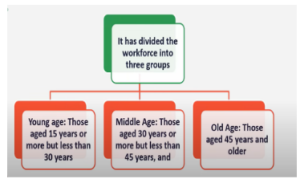Ahmedabad
(Head Office)Address : 506, 3rd EYE THREE (III), Opp. Induben Khakhrawala, Girish Cold Drink Cross Road, CG Road, Navrangpura, Ahmedabad, 380009.
Mobile : 8469231587 / 9586028957
Telephone : 079-40098991
E-mail: dics.upsc@gmail.com

Young Indians, Aging Workforce
News: An analysis of India’s workforce, sourced from Centre for Monitoring Indian Economy (CMIE) Economic Outlook data reveals that despite having the largest youthful population, the workforce is undergoing a significant aging process.
Background:
• Increase in Youth Population - The segment of the population categorized as youth increased in size from 35.49 crore in 2016-17 to 38.13 crore in 2022-23.
• Decline in Young Workforce - In 2016-17, there were 10.34 crore people under the age of 30 years in the workforce. By the end of 2022-23, this number had fallen by over 3 crores to just 7.1 crore.
Key Findings:
• The share of India’s youth has fallen from 25% in 2016-17 to just 17% at the end of the last financial year in March.
• The share of those in the middle age group has fallen from 38% to 33% over the same period.
• The oldest age category has grown its share from 37% to 49% with the portion of those aged 45 and above rising from around one-third to nearly half.
What are the challenges with ageing workforce?
• India currently lacks a comprehensive infrastructure for elderly care and a viable social support system for senior citizens.
• A significant portion of state governments’ revenues is consumed by pension expenses. Only one-third of the elderly in India receive some sort of pension.
• 90% of the workforce in India is in the informal sector, which has poor social protection for older persons, compounded by their relatively low savings.
• A 2012 study by the United Nations Population Fund shows that poverty rates are higher among older persons, with a large proportion of them being economically fully dependent (52%) and partially dependent (18%) on others for livelihood. 9.3 million individuals aged 61 and older availed work benefits under the Mahatma Gandhi National Rural Employment Guarantee Act (MGNREGA) scheme in 2019-20.
Way Forward
• Differentiated Approach for Planning - The percentage of the overall population occupied by older individuals varies across different states. Thus it is important for tailoring distinct strategies for planning based on the specific circumstances of each state.
• Progressively increase the retirement age, helping governments in keeping the pension system solvent.
• A network of caregivers and facilities dedicated to elder care needs to be established. This would involve engaging unemployed working- age adults in providing services to the elderly.
• Issues such as ageism and discrimination need to be addressed and greater inclusion and diversity in the workplace needs to be promoted.

Address : 506, 3rd EYE THREE (III), Opp. Induben Khakhrawala, Girish Cold Drink Cross Road, CG Road, Navrangpura, Ahmedabad, 380009.
Mobile : 8469231587 / 9586028957
Telephone : 079-40098991
E-mail: dics.upsc@gmail.com
Address: A-306, The Landmark, Urjanagar-1, Opp. Spicy Street, Kudasan – Por Road, Kudasan, Gandhinagar – 382421
Mobile : 9723832444 / 9723932444
E-mail: dics.gnagar@gmail.com
Address: 2nd Floor, 9 Shivali Society, L&T Circle, opp. Ratri Bazar, Karelibaugh, Vadodara, 390018
Mobile : 9725692037 / 9725692054
E-mail: dics.vadodara@gmail.com
Address: 403, Raj Victoria, Opp. Pal Walkway, Near Galaxy Circle, Pal, Surat-394510
Mobile : 8401031583 / 8401031587
E-mail: dics.surat@gmail.com
Address: 303,305 K 158 Complex Above Magson, Sindhubhavan Road Ahmedabad-380059
Mobile : 9974751177 / 8469231587
E-mail: dicssbr@gmail.com
Address: 57/17, 2nd Floor, Old Rajinder Nagar Market, Bada Bazaar Marg, Delhi-60
Mobile : 9104830862 / 9104830865
E-mail: dics.newdelhi@gmail.com